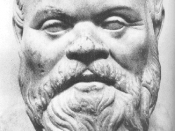Lessons to Live By
In his book, Beyond Bumper Sticker Ethics, author Steve Wilkens discusses nine ethical views that are prevalent in cultures today. Although the systems are sometimes vague, and his discussions, a bit biased, I find myself fortunate because I seem to agree with most of his opinions that he lets slip.
The first ethical belief that the author discusses is Cultural Relativism. It talks about the how diversity is becoming more and more apparent between different cultures worldwide. The author mentions that often customs that are unquestioningly accepted in one part of the world are considered abhorrent in another, for example: human sacrifice. Cultural Relativism claims that there are no absolute standards for moral judgment. Basically says that the values that every culture isn't necessarily wrong, just different. I almost completely disagree with this view. The largest problem I have with it rejects absolute truth and its existence.
If one were to make the statement "there is no absolute truth," they would have just proven themselves wrong because that is a self-defeating statement.
For example, Communism and Christianity make divergent claims concerning the nature of reality. One or the other may be correct, or neither is correct; but they both cannot be correct at the same time. According to the Law of Non-Contradiction, no statement can be both true and false at the same time. Only one ethical view can correctly mirror reality (truth). Cultural relativism is built on the belief that truth is always relative to a non-absolute standard: one's own culture. This leaves God completely out of the picture or rather puts culture in the role of God. I do not agree with the belief that this ethical view presents referring to judging cultures. Sometimes you have to judge other cultures. What I mean...


